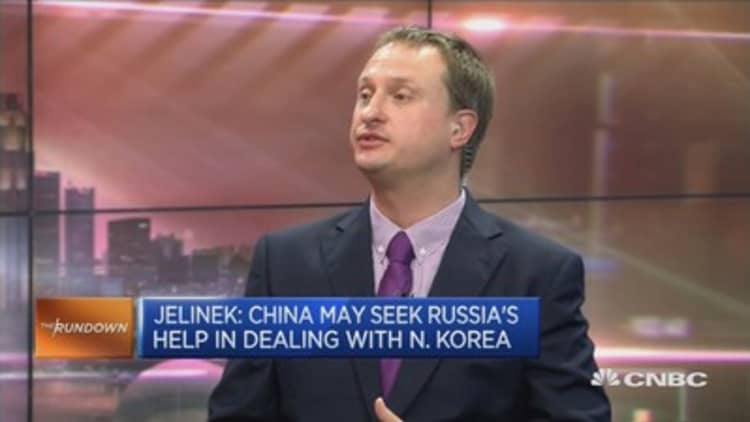
Things may have turned for the worse between the United States and China.
Even before an increasingly dangerous North Korea exposed divisions between the world's two biggest economies, the relationship between the U.S. and China was already souring. And the seemingly friendly Mar-a-Lago resort meeting between U.S. President Donald Trump and Chinese President Xi Jinping is becoming a distant memory.
Consider the steps the Trump administration has taken just since late June:
1. Naval operations in the South China Sea
On July 2, the U.S. carried out its second "freedom of navigation" operation during Trump's presidency, as a U.S. warship sailed near a disputed island in the South China Sea.
The United States is highly unlikely to pull forces out of Asia, even if North Korea is trying get U.S. out of the region, said Jonathan Pain, author of investment newsletter The Pain Report.
2. Weapons to Taiwan
Days before China celebrated the 20th anniversary of Hong Kong's handover to the mainland from the British, the U.S. said it plans to sell $1.4 billion in arms to Taiwan in what is seen by Beijing as an affront to the "One China" policy. A U.S. State Department spokeswoman told reporters however that there has been no change to the United States' official acknowledgement that Taiwan and mainland China are a single entity.
Chinese foreign ministry spokesperson Lu Kang argued last week that by selling arms to Taiwan, the U.S. has "severely violated international law" and jeopardized China's sovereignty and national interests."
3. New sanctions on Chinese individuals
The U.S. imposed new sanctions on a Chinese shipping company and two Chinese citizens tied to North Korea. The Treasury Department's Financial Crimes Enforcement Network also proposed banning U.S. financial institutions from doing business with the Bank of Dandong.
Asked about the U.S. sanctions on Friday, the Foreign Ministry's Kang said that China consistently opposes unilateral sanctions imposed outside the U.N. framework.
"We strongly urge the U.S. to immediately correct its mistake, so as not to impact bilateral cooperation on relevant issues," he said.
4. Harsh words on steel and aluminum
Trump hinted this week via his favorite communication mode — Twitter — that his administration may be gearing up to protect the U.S. steel industry.
That came after three senior administration officials told Reuters last week that the U.S. president was growing increasingly frustrated with China over North Korea and other issues, and was considering possible trade actions against Beijing. Options include tariffs against steel imports.
Miscalculations by both sides
The shift in America's stance toward China comes amid disappointment from Washington over Chinese inaction against North Korea. The reclusive country has persisted with missile tests, and this week appears to have launched an intercontinental ballistic missile for the first time.
"Washington's recent moves in South China Sea, plans for steel tariffs and the rubber-stamping of an arms sale to Taiwan indicate that Trump is shifting toward a more hard-line approach on China," said Guo Yu, principal China analyst at Verisk Maplecroft.
This comes after seemingly warm relations after Mar-a-Lago, with Trump calling Xi "a very good man" later in the same month.
"What we've actually seen was a toning down of rhetoric over the last few months (following Mar-a-Lago) because I think President Trump genuinely believed that Xi Jinping would be able to do something to rein in North Korea," said Frontier Strategy Group Senior China Analyst Josef Jelinek. "I think what's happened is that there's been a miscalculation."
Trump "over-valued" his personal touch with Xi, said Jelinek.
There was misjudgment on China's part as well.
"China miscalculated what would be the minimum they would have to do to buy off President Trump," Jelinek said. "I think they probably thought a few high-visual maneuvers such as banning coal shipments would do the trick."


